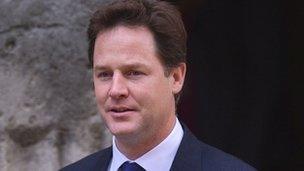Torture? Not really...
- Published
- comments
If the Liberal Democrats honestly believe Tory backbenchers will be cowed into supporting the Lords Reform Bill by the threat that they will vote with Labour to stop boundary changes intended to reduce the number of Commons seats, they're sorely mistaken.
The Tory leadership want the changes, because they believe the current boundaries load the electoral dice against a Conservative victory. The Tory footsoldiers, on the other hand, hate the resulting constituency shake-up, which could see quite a few of them out of Parliament, having struggled for years to pass through the pearly gates of Westminster.

Lib Dem threats over Lords reform may be seen as risible by some Tory backbenches
So the prospect of the Lib Dems opposing the orders to implement the boundary changes, some time next year, is likely to encourage the rebels rather than deter them. And it's the rebels who are the problem, not the leadership who are - by all accounts - making a real, if unenthusiastic, effort to get Lords reform through.
In short, Nick Clegg is casting himself as Cardinal Biggles in the classic Monty Python Spanish Inquisition sketch: cackling evilly, while failing to realise that his fiendish tortures are nothing of the kind. (Indeed, plenty of his own Lib Dem troops might prefer if the boundary changes were not implemented.)
But much rests on the votes on Lords reform at the end of the second reading debate on Tuesday night. With Labour pledged to support the bill at second reading, there should be no danger of defeat there.
Even so, the list of Conservative and Labour opponents will be studied with interest in their respective whips offices as they ponder the prospects for later encounters.
The first will be the vote on the programme, or timetable motion, immediately after the second reading vote. Here, Labour are pledged to oppose the government and so, we're told, are 100 Tory rebels, including several ministerial bag-carriers. If it's really 100, the government's notional majority of 78 will have melted away. But the expectation is that many of those currently chuntering about the bill will wilt under pressure from the whips.
If they hold firm, there's a good chance the government may not put the programme motion to the vote - with a whip simply shouting "not moved" when the moment comes.
And then, perhaps, the empire will strike back. If the Commons is so keen on unlimited scrutiny of Lords reform, let them have it; postpone the summer recess for a few days and let the debate run through the night….see how they like that.
Many of the new intake have scant experience of the loneliness of long-distance late-night legislating - and a couple of long nights on-call for votes, which might be forced at any moment, might instil a healthy appreciation of the virtues of programming. And if that's not enough, give 'em a miserable September, with day after day of committee stage debate.
The Conservatives' problem is that they have to show willing in order to keep the Lib Dems on board in the coalition. Nick Clegg's party is still bruised by the experience of the AV referendum, when its leader was targeted as a dishonest trimmer by a Conservative-led No campaign, for making a policy compromise with, er, the Conservatives. That has not been forgotten or forgiven and the consequences of what would certainly be seen as a further betrayal, would be toxic indeed. So the Tory whips have to be seen to be applying the thumbscrews, because the Lib Dems will take some convincing that they have not been double-crossed.
But if a combination of legislative grind, and appeals to loyalty and coalition solidarity fail to work, maybe another Monty Python sketch will be invoked to describe Nick Clegg's ambitions for Lords reform and maybe Nick Clegg himself; the one about the dead parrot.